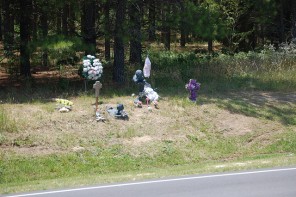Luke Wortley

It’s around the midpoint of the semester when you walk into the room at your tiny liberal arts college and find this cluster of students stacked on top of one another. You’re trying your best to keep them separate in your head, but those in the pile just fold into each other, packed in like cooked mussels. You take attendance the best you can. There’s a singular voice as their throats rumble in unison and ask about the nature of energy and mass, how they can possibly exist on separate sides of the equation. You tell them, in increasingly muffled tones, that that’s just how it is, that the mathematics are beyond you other than the simple elegance of special relativity. You tell them that this is beyond the scope of your course. The mass of students moans in response. So you tell them they must understand, if they are to understand anything, that individualism, when properly constrained by class solidarity, can be quite healthy. Those still unsure look at you with the glassy eyes of aspirant doom, waiting for you to make a statement on something more definitive, to craft a theory they can all agree on, something to separate what they’ve heard from what you’re saying. But what can you possibly say in this course on postcolonial literature that will impress upon them the importance of unintended consequences that you haven’t said before? When you walk out, the murmurs go silent.
Next class, more join the pile, and the questions just keep coming. It’s already getting to the point where you can barely make out their mouths and there’s just this hunk of flesh and zippers pushing the tables to the walls. This time they ask about grief, about whether or not there really is a process, that they must know, now, something concrete, not the bullshit theory you keep feeding them. The air is growing sticky with animosity. Perhaps it’s just that point in the semester when everyone is just about to get slightly sick, when everyone is teetering on the edge of a shouting match with their well-intentioned family members. So, you play along. You tell them that grief is anything but a process, that it’s a fluttering wave of bat wings consuming the night, that it’s a gorgeous, clean-edged hole in the center of rotting flesh, that it’s a massive suspension bridge. But, they say, when you consider what you said last class, perhaps it’s not really that elegant. That’s true, you respond. Now, please, let us try and apply these new principles to the subaltern. What might Spivak say about grief? The final remaining students seem assured just by the agency of asking a different sort of question aloud.
Right before the break, it’s just you and the group jammed into what feels like a smaller space than usual. They’ve all banded together, slid into each other’s cavities, it seems, slipped skins and melded throats. They ask you if there’s such thing as a heuristic for telling which god is the one true God. You realize this is a losing battle today, that perhaps after the midterms, it’ll have dissembled, gone to see families, exorcised its attempts at stoking your own penitence. You tell them that heuristics can be dangerous, that, if anything, rather than being legitimate means of processing inquiry, they’re really just approximations. No, they shout. That can’t be true. Tell us, then, something conclusive about anything. Having nothing to say, you pivot to asking them the question they must write about for their mid-terms, the one you can’t help but ask: What does the text we’ve read for today reveal about the cultural difference, the operations of power, and the existence of the other?
Over the break, you sit in your home and think of the entangled morass of students, the way they all just glommed onto each other and commandeered the discussion. How you barely skinned the edge of essentialism and hegemony, only coquettishly danced around the subject of alterity, emergence. All these things are basic concepts, but you’re sitting there, in the midst of deconstructing an argument on animality in Columbus’s letters to the royals. You’re wondering how you can get it back on track, how things can unencumber, slam back into individual bodies, how the semiotics of place and time and classroom can mesh inside the head of each student as themselves.
You sit in your home and watch the cat stretch.
You sit in your home and subtweet colleagues on Twitter.
You sit in your home and grade.
You sit in your home and contemplate the way a mind might wrap itself around the truly hypocritical nature of your delivery. Perhaps it’s no wonder your students have all rebelled against you. Here you are, spouting off, trying to impress upon them the importance of ambivalence while you get to regard a cat, grapple with ancestry, and ultimately regurgitate talking points for a living. Perhaps they’re telling you that none of this is that important. But, if that’s true, then why do you feel such immeasurable guilt?
Upon return to classes, you waste no time in asking them whether or not societies and cultures can ever be postcolonial. They’re mercifully separate when you enter the room, discreet bodies. A student raises her hand. Her name is Hannah. She says, I don’t understand the question.
You say, that’s valid.
So, you try again. Does an anti-colonial psychology of resistance lend itself to a truly postcolonial identity? Furthermore, can we overcome hegemony by choice?
Another student raises a hand. His name is Connor. He asks to use the bathroom. You say that he doesn’t have to ask to use the bathroom.
When he gets up, he taps his friend on the shoulder playfully, and his arm is sucked into his friend’s body. There’s a gasp from everyone else, and you’re trying to remain calm. Hannah, who sits in front of them, turns around, and you see her hair yanked toward the writhing young men. She’s being absorbed, too. Then the rest are all getting up and silently walking over to the growing mass. There’s nothing you can do to stop it. But you keep your distance, feeling its pull. You feel a hot wind as though you’re standing next to a gigantic tractor. The room itself seems to sway and heave with breath.
Tell us, the mass of students says, how we’re supposed to feel.
About what, you ask.
You can feel a sauntering anger rising from them, the hint of an advancing step toward you. You back away and lean up against the dry erase board, grab a marker, and try to ease into your most professorial mien. There’s a thrumming pulse to them, and they inform you that they no longer wish to discuss postcolonialism and its various lenses, that they’re tired of feeling so shitty about themselves and where they come from. They inform you they will not, in fact, be submitting revisions concerning de Tocqueville’s letters that you’ve been pushing the deadline back on for weeks. Tell us how we’re supposed to feel, they say again.
I don’t understand the question, you say.
That’s preposterous, they boom. Tell us something.
I suppose, you begin, that it’s probably something coiled deep in your bones that makes you opposed to this course.
The swaying continues, and their form is bearing down on you, their breaths all slathered with the scent of ocean.
Tell us, they whisper. All their voices melded into a slow whine. You think, in the distance, there’s the sound of a dog barking softly.
Or, alternatively, you say, it’s my own fluid blathering.
Yes, they say. Yessss.
Perhaps that’s it, you continue. It’s the endless drone of sanctimonious bullshit.
The form wiggles in excitement. You are afraid, but the truth is unmistakable.
And so you let the words roil out of your mouth. It’s a fundamental contradiction that I stand up here and rail, I know. It’s a dithering set of circumstances, a typhoon of illogicality that I stand up here and act as though I’m not the oppressor, the grand subjugator, a king ordering the waves of colonizers himself. I know.
So, why do you do it? they ask. Tell us something real. We’re starting to get it.
Because it matters, you say, to be aware of your past.
But what, they say, are we supposed to do about it?
That’s a salient point, you say.
That oceanic swell of their voices fills your head, and you can still taste the salinity of their questions. All at once, they’re backing up, pushing chairs out of the way, separating into their individual forms, disentangling themselves and popping away from this central mass with such alacrity you cannot help but gape, open-mouthed. What you mean to ask, next, then, is the following: How might we be reinforcing colonial ideology in this very course? How does the text we’ve read for today serve to undermine traditional modes of silence? What comes out, instead, is a pitiful shriek as your throat fills with the taste of a thousand crushed spices.
Luke Wortley is a writer living in Indianapolis, Indiana. His fiction and poetry have appeared or are forthcoming in Inch, Hobart, Best Microfictions, Pithead Chapel, Cincinnati Review, and elsewhere. You can follow him on Twitter (@LukeWortley) or visit https://www.lukewortley.com/




